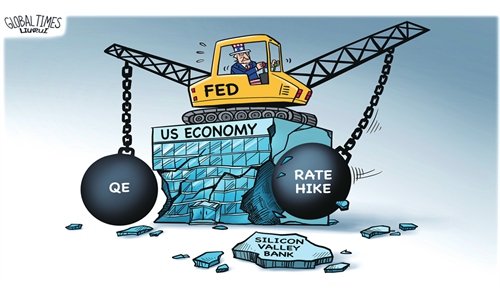All countries should be alert for financial risks amid high rates: official
China aims to set up new intl financial governance system along BRI

A customer stands outside of a shuttered Silicon Valley Bank (SVB) headquarters on March 10, 2023 in Santa Clara, California.?Photo: VCG
Countries should be alert to more potential financial risks amid global interest rates hikes, Chinese officials said over the weekend.On the heels of the recent US bank failure, they suggest that China establish a new international financial governance system along the China-proposed Belt and Road Initiative (BRI).
"Following the recent failure of Silicon Valley Bank [SVB] and some other banks in the US and the EU, all countries should be on guard for financial risks that could gradually emerge as high interest rates across the world will likely persist," China's Vice Finance Minister Xia Xiande said at the Global Asset Management Forum held in Beijing over the weekend, Thepaper.cn reported on Saturday.
The failure of SVB is only the tip of the iceberg, as many smaller US banks face the same plight. Meanwhile, high US dollar interest rates continue to drive capital outflows from emerging markets and many countries face higher debt costs, which may trigger financial crises in some regions, Liang Haiming, dean of the Hainan University Belt and Road Research Institute, told the Global Times on Sunday.
However, given China's sound macroeconomic operation, appropriate banking regulations and Chinese commercial banks' stable operation strategies, financial risks similar to the collapse of SVB and troubled Credit Suisse will not occur in China, experts noted.
"Faced with challenges such as the COVID-19 epidemic and unprecedented interest rate hikes adopted by developed economies, China always sticks to a prudent monetary policy and relies more on fiscal stimulus to bolster the economy, which ensures stable interest rates in China," Cao Heping, an economist at Peking University, told the Global Times.
By contrast, US banks have become accustomed to the environment of low interest rates over the past decade, and thus the US Federal Reserve's unprecedented interest rate hikes since March 2022 make US banks like SVB, which attracted short-term deposits but held long-term investments, more fragile, according to Cao.
A lesson from the collapse of SVB is that China should explore a financial risk management system based on the domestic situation while taking into account the impact of external factors, Cao said.
According to data released by the China Banking and Insurance Regulatory Commission, Chinese banking financial institutions saw a steady expansion in assets of 10 percent year-on-year to total 379.4 trillion yuan ($55.09 trillion) in 2022.
By the end of 2022, the nonperforming loan ratio of commercial banks stood at 1.63 percent, 0.02 percentage points lower than the level at the end of the third quarter of 2022.
It is crucial to improve the financial regulatory system and strictly maintain the bottom line of low risks, Lou Jiwei, director general of the Global Asset Management Forum and also China's former finance minister, said at the forum.
"We will continue to work with financial regulators from other countries to jointly prevent and defuse global financial systemic risks and maintain global financial market stability and prosperity," Lou said.
The world needs a new international financial governance system, as the US Fed's interest rate hikes have dealt a blow to the monetary and financial systems of emerging economies and developing countries, leading to distrust in the US dollar, Liang said.
China should join hands with other countries to establish a new international financial governance system along the BRI that is more fair, open and transparent so as to increase emerging countries' influence in the system, boost the establishment of rules for fintech, green finance and other new financial products, and strengthen the global financial net, he said.


